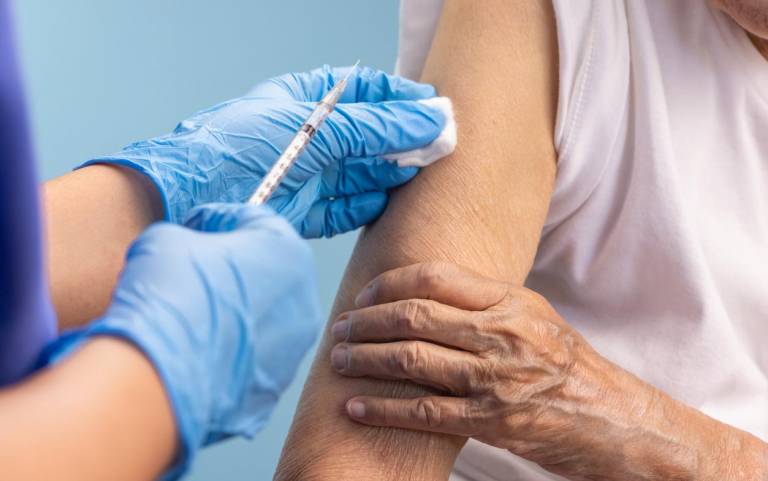Booster jabs strongly enhance Covid-19 immunity in care home residents and staff
22 December 2021
A Covid-19 booster vaccination markedly increases immune response in residents and staff within care homes, according to a new preprint study co-led by UCL researchers, making it vital that people living and working in these settings get their third jab.

Age and frailty are already recognised as major risk factors for severe Covid-19 outcomes, with elderly residents of long-term care facilities suffering much higher rates of mortality during the pandemic than the general population.
Single or dual Covid-19 vaccination has provided strong clinical protection against severe disease within this group, but there has been concern about the potential impact of immunity waning and the need for vaccine boosters in those at greatest risk.
Researchers studied immune responses in 134 staff and residents in 19 long-term care homes who had received an mRNA booster vaccine (Pfizer), following two doses of either the Pfizer or AstraZeneca vaccines.
In a preprint article published on SSRN (yet to be peer-reviewed), they show that SARS-CoV-2-specific antibody responses were substantially increased in this vulnerable population after a third dose of vaccine – calculated from blood samples collected from 25 May to 18 November 2021. Median time of sample collection after booster shot was 28 days for this cohort.
Previous research from the Vivaldi study team had shown that prior natural infection strongly enhanced subsequent Covid-19 vaccine responses, but that uninfected older people who had been vaccinated exhibited a weaker immune response. This effect was overcome following a booster vaccine, which led to antibody response in this group increasing 12-fold (1,100%).
This increase brings the antibody response in residents on a par with the younger population – significantly lessening the effect of age that contributes to making elderly people more vulnerable to Covid-19.
The team analysed antibody and cellular response against both the Wuhan strain and the Delta variant, observing that both antibody and cellular responses were strong.
They found that among staff and residents with evidence of prior natural infection, the booster increased antibody levels by 4.1-fold and 3.2-fold among staff and residents respectively. Among participants without evidence of prior infection, the booster vaccine led to a much larger increase in antibody response in staff and residents - with relative increases of 6.4-fold and 12.3-fold respectively.
Another important observation from the study was that the type of initial vaccine had no effect on the strength of the immune response after booster. Regardless of the initial vaccine type the data shows that all those that received a booster had a significant immune response to Covid-19.
Joint senior author Professor Laura Shallcross (UCL Institute of Health Informatics), leader of the overall Vivaldi study, said: “These findings emphasise just how important it is for both care home staff and residents to get a booster vaccine - particularly since the emergence of the omicron viral variant, where booster vaccination appears essential to suppress viral infection rates.”
First author Dr Gokhan Tut from University of Birmingham commented: “We found that a third vaccine dose produces a strong immune response for participants who initially received both Astra Zeneca and Pfizer vaccines.
“The booster also delivers a relatively stronger enhancement of antibody response in people without ‘fourth exposure’ from natural infection. This effect is most profound in the older population – creating equivalent antibody levels in younger and older participants, thereby overcoming the negative influence of age that was seen following dual vaccination.”
The research was part of the ongoing, UCL-led Vivaldi study, launched in June 2020 to investigate Covid-19 infections in care homes and inform strategies to protect residents. It is funded by the UK Department of Health and Social Care.
Links
- Vivaldi study
- Professor Laura Shallcross’s academic profile
- UCL Institute of Health Informatics
- UCL Population Health Sciences
Image
- Credit: iStock.
Media contact
Mark Greaves
T: +44 (0)7990 675947
E: m.greaves [at] ucl.ac.uk
 Close
Close

